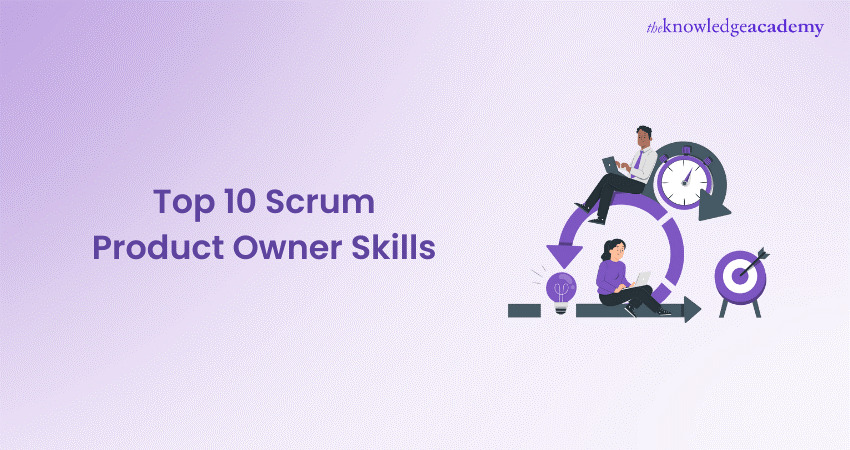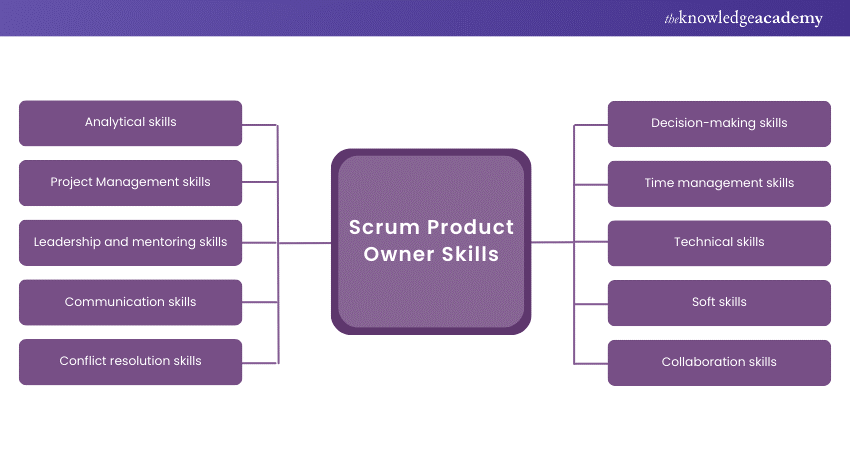We may not have the course you’re looking for. If you enquire or give us a call on 01344203999 and speak to our training experts, we may still be able to help with your training requirements.
We ensure quality, budget-alignment, and timely delivery by our expert instructors.

In the fast-paced realm of Agile methodologies, a Scrum Product Owner's role is critical and transformative. They are the strategic compass guiding the project to its successful destination. With a unique blend of expertise, the Scrum Product Owner Guide shows how the Scrum Product Owner orchestrates the team’s efforts, ensuring that each sprint leads to tangible value. This blog post delves into the pivotal Scrum Product Owner Skills, shedding light on the capabilities that are crucial for navigating the challenges of successful project delivery in the Agile world.
Table of Contents
1) Who is a Product Owner?
2) Top 10 Scrum Product Owner Skills
3) Essential tips to improve Product Owner Skills
4) How to highlight Product Owner Skills?
5) Conclusion
Who is a Product Owner?
The Product Owner acts as the customer’s voice within the Scrum Team. They are the ones who know the market, product line, and business strategy inside out. They are given the power to take the product to an advanced level and are responsible for either the success or failure of the project.
The Product Owner is tasked to specify the product's features and select the release dates and content for each iteration in Scrum. They guarantee that the Scrum Team focuses on the essential things for business purposes, pointing the work items (user stories, use cases, etc.) in the backlog of the product in accordance with business goals.
Top 10 Scrum Product Owner Skills
Here’s an in-depth look at the top 10 skills essential for a Product Owner:

1) Analytical skills
A Product Owner has to be able to split complex issues into smaller, more manageable pieces. It is understanding the product’s market, customer needs, and hurdles that come up. Through data analysis and customer feedback, a Product Owner can identify trends, predict future patterns and make decisions based on data that will contribute to the overall value of the product.
2) Project Management skills
Managing projects is key to a Product Owner’s role. They should schedule sprints, administer backlogs, and make sure all project phases meet the overall objectives. It involves resource allocation, risk assessment, and scope, time and cost management in order to get a product delivered on time.
Keen on becoming an efficint Scrum Product Owner, refer to our Scrum Product Owner Guide.
3) Leadership and mentoring skills
Leadership is key for motivating and guiding the team of developers. Product Owners should build trust among team members, establish clear rules and foster their technical development. They perform as mentors, giving encouragement and feedback to cultivate a climate of continuous improvement.
4) Communication skills
Communication plays a significant role in ensuring that the team and stakeholders see the same thing, that is, the project’s vision. A Product Owner needs to communicate thoughts effectively, listen attentively, and facilitate discussions. They act as the contact between the development team and external stakeholders in order to keep everyone updated and involved.
5) Conflict resolution skills
Disagreements are inevitable in any team setting. A Product Owner must handle conflicts with diplomacy and tact, finding solutions that satisfy all parties involved. This skill helps maintain a positive team dynamic and prevents disputes from derailing the project.
6) Decision-making skills
Keeping the project on track demands making rapid decisions that are based on facts. A Product Owner needs to analyse the advantages and disadvantages of all proposed alternatives and consider all impacts on the project before making confident decisions. Team members don't waste time making decisions, which helps us avoid delays and move forward unhesitatingly.
Lead Agile teams effectively – get your Scrum Product Owner Guide today!
7) Time Management skills
Product Owners should be able to juggle many tasks and deadlines and prioritise the priority tasks. They must also track their own and the group’s time effectively to make sure critical tasks are done first, and the project runs smoothly.
8) Technical skills
Although a Product Owner doesn’t have to be a technical whizkid, a good grasp of the technology underpinning the product gives him a head start. This knowledge helps them to make better decisions, work with the development team efficiently, and detect technical challenges and possible solutions.
9) Soft skills
Emotional Intelligence, adaptability, and creativity are key in managing a multidisciplinary team. The Product Owner should be able to read a room well, change their approach depending on the problem, and use some creativity to solve issues and foster innovations.
10) Collaboration skills
Collaboration is the main factor for Agile projects to be successful. The Product Owner should cooperate with the development team, stakeholders, and customers to ensure that the product achieves the intended objectives. They help teamwork, encourage communication, and form strong bonds to reach the desired aim.
These skills are interdependent and collectively contribute to the Product Owner’s ability to successfully lead a Scrum team and drive the development of a product that meets the users’ needs and business objectives. Mastery of these skills enables a Product Owner to navigate the complexities of product development with agility and confidence.
Boost your Agile projects skills with our Managing Agile Projects With Scrum Course - sign up now!
Essential tips to improve Product Owner Skills
Here are some tips to improve Product Owner Skills:
a) Discover all relevant data: A Product Owner's role requires making decisions based on solid evidence. We can acquire data through various avenues, such as market trends, customer reviews, team retrospectives, and performance indicators. Through this blend of data, a Product Owner can choose courses of action that comply with the strategic objectives of the product and the organisation.
b) Regularly participate in team meetings: The involvement of Scrum team members during the sprint planning, daily standups, reviews and retrospectives is a must. It keeps the product owner in the loop regarding the team’s progress, issues, and learnings. This constant interaction not only enables easy troubleshooting but also builds a supportive environment that nurtures the spirit of teamwork.
c) Keep learning: The Agile environment is constantly expanding, with ongoing introduction of new frameworks, tools, and best practice models. Staying abreast with these developments can be done through courses, certifications, conferences, and community involvement, which are very crucial. Learning plays an irreplaceable role in ensuring that a Product Owner remains a valuable team member and an organisation's dynamic asset and tool for change and innovation.
Enhance your organisational efficiency through our Scrum For Teams Course - sign up now!
How to Highlight Product Owner Skills?
a) During the job interview: While interviewing for the role of Product Owner, it’s essential to showcase your expertise through stories that will illustrate the impact you had on the projects before. Tell about the cases when you have faced complex issues, leading your team to success and making customers and stakeholders satisfied. Illustrate your analytical competence, leadership skills and ability to effectively prioritise product backlogs through specific examples.
b) In resumes: Your resume should tell the story of what you achieved as a Product Owner. Emphasise measurable results, such as the rise in customer satisfaction, acceleration of team velocity, or product excellence. Highlighting these accomplishments will help to demonstrate your abilities and how they affect the completion of your tasks directly.
c) At the workplace: The best way you can demonstrate your Product Owner expertise is by consistently providing results. Lead by example, start the resolution of the problems, and participate in the production of high-quality products. Your ability to collaborate with cross-functional teams, manage stakeholder expectations, and steer the product in the right direction will not go unnoticed.
Gain a deep understanding of the Scrum teams with our Scrum Product Owner Certification Course - sign up now!
Conclusion
Scrum Product Owner Skills combine technical expertise with soft skills, which is essential for guiding Agile projects. Mastery in Project Management, leadership, and communication ensures effective team alignment and decision-making. By honing these abilities, Product Owners can significantly enhance their project outcomes and career trajectory, becoming invaluable assets to their teams and organisations.
To be an expert at Scrum, sign up for our Scrum Master Certification today!
Frequently Asked Questions
What are the key responsibilities of a Scrum Product Owner in Agile Project Management?

The key responsibilities of a Scrum Product Owner include defining the product vision, prioritising backlog items, communicating requirements to the development team, collaborating with stakeholders, and ensuring the product meets customer needs.
How does a Scrum Product Owner prioritise backlog items?

A Scrum Product Owner prioritises backlog items based on business value, customer feedback, market trends, and strategic goals. They make decisions about product features by considering input from stakeholders and aligning with the overall product vision.
What are the other resources and offers provided by The Knowledge Academy?

The Knowledge Academy takes global learning to new heights, offering over 3,000 online courses across 490+ locations in 190+ countries. This expansive reach ensures accessibility and convenience for learners worldwide.
Alongside our diverse Online Course Catalogue, encompassing 19 major categories, we go the extra mile by providing a plethora of free educational Online Resources like News updates, Blogs, videos, webinars, and interview questions. Tailoring learning experiences further, professionals can maximise value with customisable Course Bundles of TKA.
What is the Knowledge Pass, and how does it work?

The Knowledge Academy’s Knowledge Pass, a prepaid voucher, adds another layer of flexibility, allowing course bookings over a 12-month period. Join us on a journey where education knows no bounds.
What are related courses and blogs provided by The Knowledge Academy?

The Knowledge Academy offers various Scrum Certification Training, including Scrum Master Certification Course, Scrum Product Owner Training and Scrum Developer Training. These courses cater to different skill levels, providing comprehensive insights into Agile Project Management With Scrum.
Our Project Management Blogs cover a range of topics related to Scrum, offering valuable resources, best practices, and industry insights. Whether you are a beginner or looking to advance your Business Improvement skills, The Knowledge Academy's diverse courses and informative blogs have you covered.
Upcoming Project Management Resources Batches & Dates
Date
 Scrum Master Certification
Scrum Master Certification
Thu 24th Apr 2025
Thu 1st May 2025
Thu 22nd May 2025
Thu 5th Jun 2025
Thu 19th Jun 2025
Thu 3rd Jul 2025
Thu 17th Jul 2025
Thu 31st Jul 2025
Thu 14th Aug 2025
Thu 11th Sep 2025
Thu 25th Sep 2025
Thu 2nd Oct 2025
Thu 9th Oct 2025
Thu 16th Oct 2025
Thu 23rd Oct 2025
Thu 30th Oct 2025
Thu 6th Nov 2025
Thu 13th Nov 2025
Thu 20th Nov 2025
Thu 27th Nov 2025
Thu 4th Dec 2025
Thu 11th Dec 2025
Thu 18th Dec 2025






 Top Rated Course
Top Rated Course



 If you wish to make any changes to your course, please
If you wish to make any changes to your course, please


